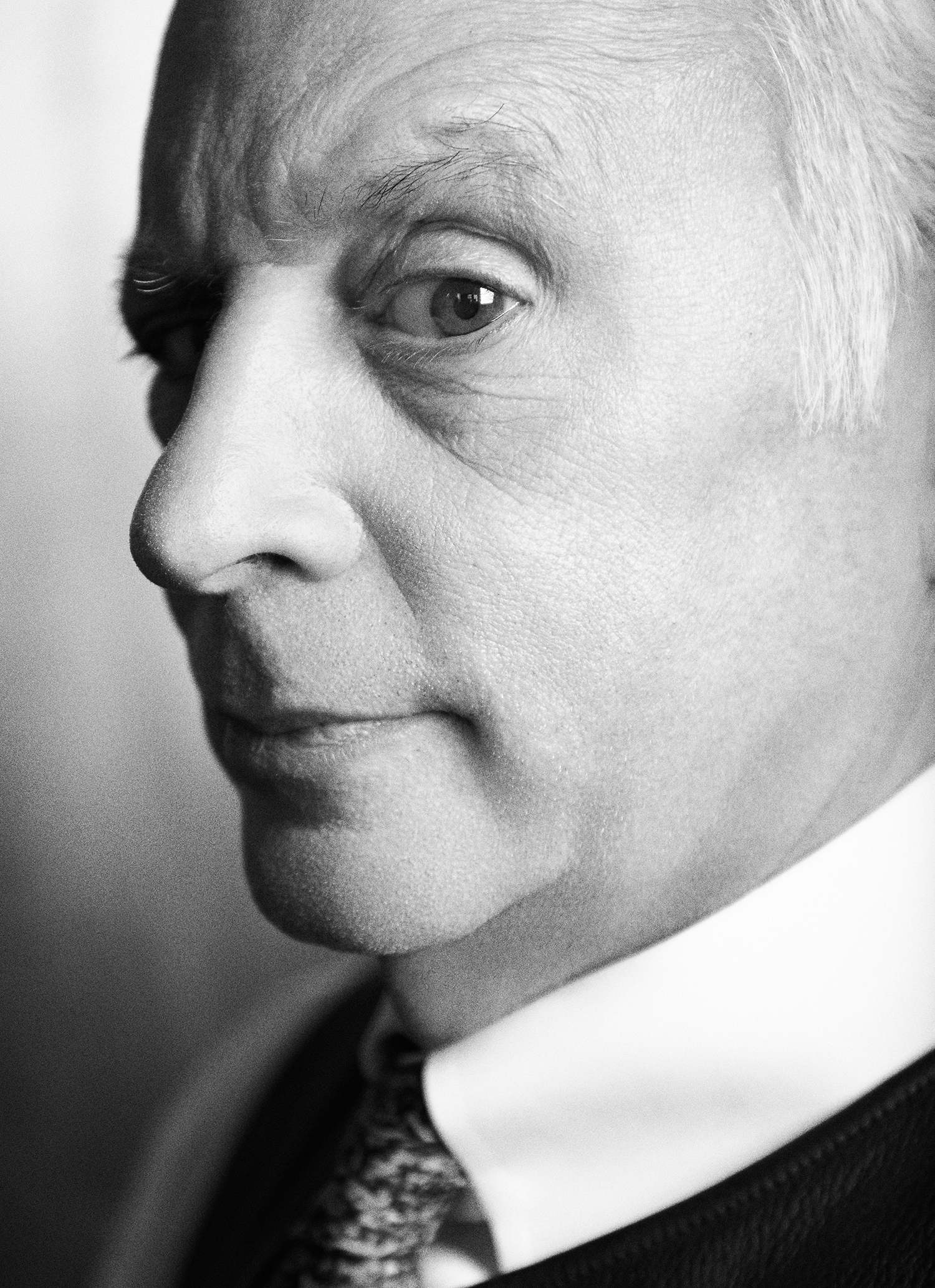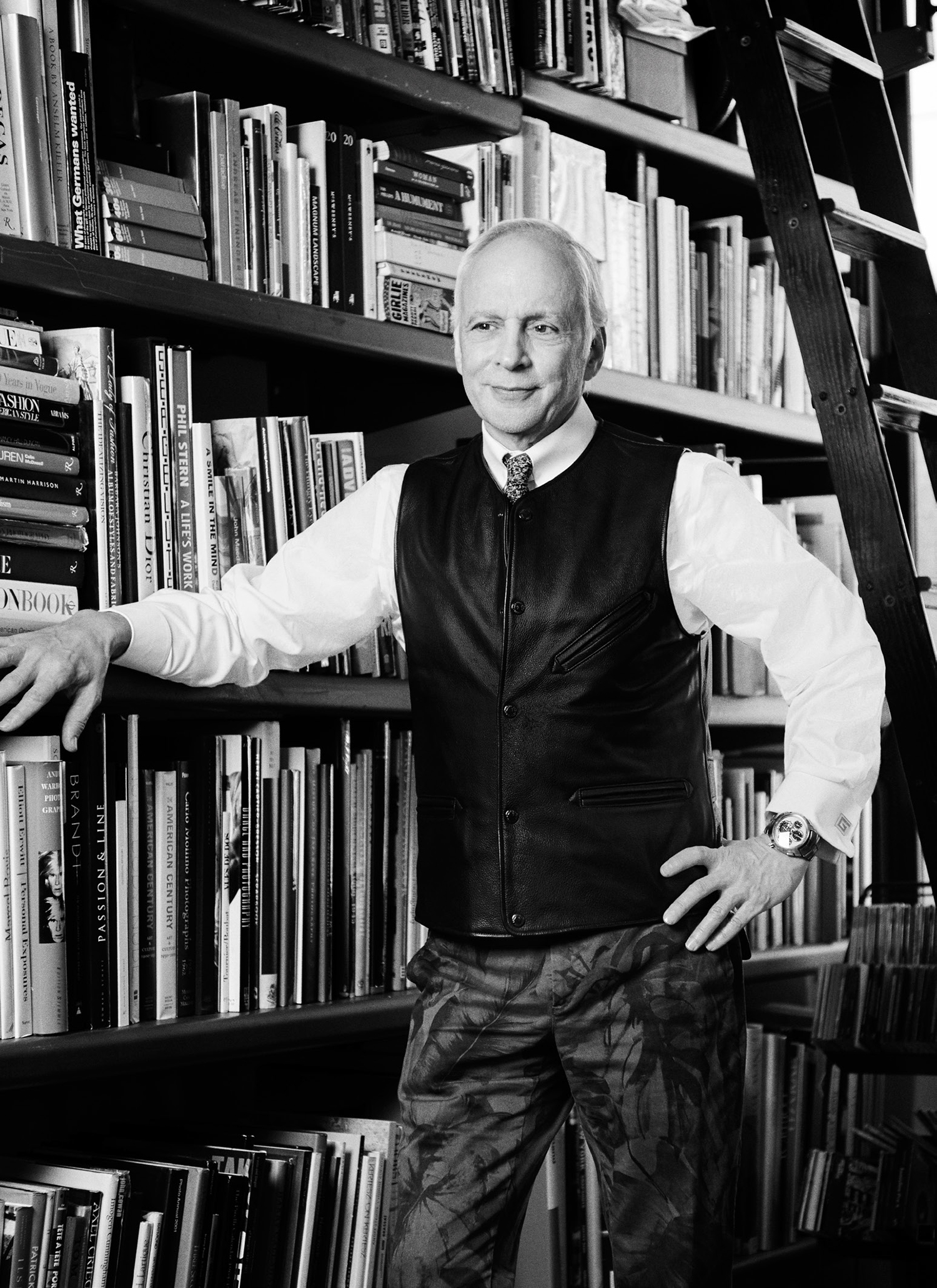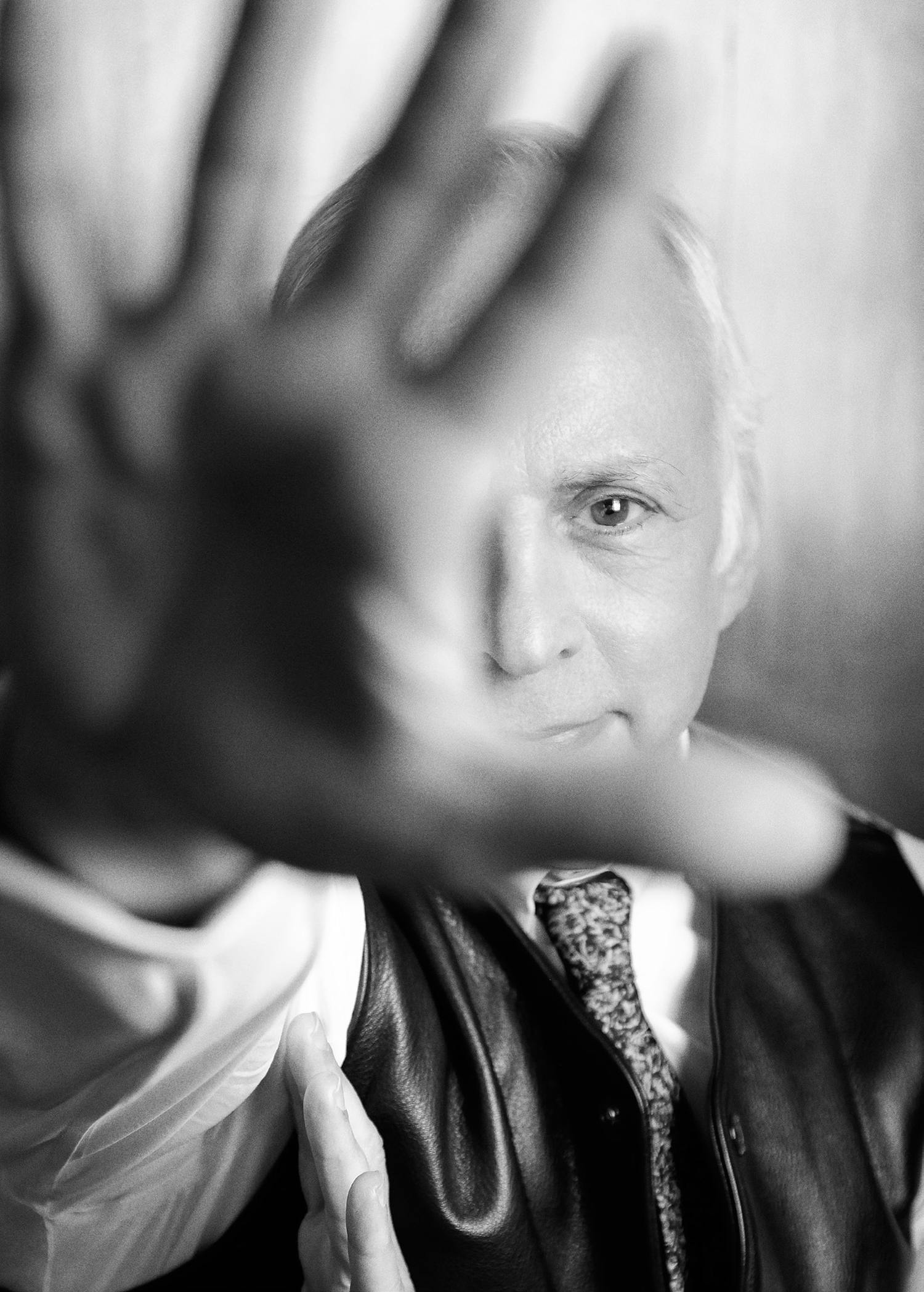IRIS MAN – B. JEFFREY MADOFF
From fashion design to producing multi-media promotional content for luxury brands, and more recently delving into the world of entertainment through directing and producing, Jeffrey Madoff has proven to be a modern Renaissance man of the creative industry.
 Photography by Dustin Mansyur | Interview by Benjamin Price | Grooming by Heather Schnell
Photography by Dustin Mansyur | Interview by Benjamin Price | Grooming by Heather Schnell
Jeffrey Madoff photographed at Madoff Production Inc. in Manhattan. Worn throughout this feature: Shirt byYSL, Vest by Engineered Garments, Tie by Fendi, Pants by J Brand, Shoes by Vintage Cufflinks, Watch by Seiko Limited Edition Arctura Chronograph
Jeffrey Madoff is constantly on the hunt for the next stimulating phenomenon in fashion, media, and marketing. He is a director, photographer, writer and professor in New York City. He is the founder and CEO of Madoff Productions, a company that handles film and video work such as commercials, web content, music videos and documentaries. His impressive list of clients include Ralph Lauren, Gucci, Hermes, Tiffany & Co. and Victoria’s Secret. His online videos for Victoria’s Secret has won a coveted Webby Award, and Madoff’s documentary films about philanthropist Brooke Astor and the iconic dancer Martha Graham have both been well received by press, such as The New York Times. In addition to these many accolades and accomplishments, Madoff also adds professor to his resume by teaching a course at Parsons School of Design, Creative Careers: Making a Living with your Ideas, which challenges students to explore various careers in the fields of fashion including photography, public relations, styling, becoming an agency owner, etc. Special guests of the class include Joe Polish, Founder and President of Piranha Marketing Inc., Sarah Laird, founder of artist representative agency Sarah Laird & Good Company, and pioneering stylist and Creative Director, Freddie Leiba, to name a few.
We met with Jeff in his Chelsea offices for a photoshoot and interview, surrounded by Jeff’s collection of antique televisions and radios which highlight his obsession with media and storytelling. He was dressed in a somewhat eccentric outfit of tropical leaf printed pants, white button-up, and brown leather vest which highlighted his personality and individual style. Speaking to Madoff, you instantly pick up on his cutting wit and intelligence, and his ability to take anything you say and make it into a clever joke or use it as a footstep into a more broad and intellectual realm of conversation. His brain is running at a mile a minute, it is almost difficult to keep up. However, past the dry sense of humor and sarcasm, you can find a trove of wisdom in each anecdote and joke. We sat down to discuss Madoff’s upbringing, his multi-faceted, ever-changing professional path, and new projects in the making.
In your class Creative Careers: Making a Living with your Ideas, there is a regular question that you ask each guest who comes to speak and share stories of their career development, so I am going to return the favor and ask you: If we knew you as a child would we have predicted this career path in any way?
If you knew me when I was young…It probably would be more informative of the direction that I’m going because I had a movie theater in the basement of the house. I took my dad’s eight millimeter projector, and I would go and rent films and design posters and walk around the neighborhood to get fifteen kids that would pay a quarter each to see a movie. That covered the popcorn, potato chips,and Coca-Cola.
When I got into film… that was a transition where I felt, “wow this is something I really want to do.” Fashion was almost a reflex. I wanted to start my own company, but I never had a desire to be a designer and probably the best thing that I learned after being in business was that I didn’t want to be in that business. But I learned, in terms of filmmaking, that they were very much the same business in terms of the protocol. When you’re designing clothes you come up with an idea, you sketch the idea, you cost it out, ask yourself what are the materials, what will the labor entail, how much can you sell it for, you have a deadline, etc. That’s the same thing with the movie business, the same thing with the play; the protocol and dynamics is the same for all of these business. I was able to take what I learned and apply it to the other things that I do. I have enjoyed telling stories since I was a kid, and that’s what I do, so the transition from fashion to film was not a big leap.
In your career you have handled media production for huge clients such as Victoria’s Secret and Ralph Lauren, but also have started your own fashion label, and are currently producing your own Broadway play, and film. However, do you think there is any validity in the phrase, “a jack of all trades, but a master of none”?
I think that one ought to explore whatever they are curious and passionate about. People may say “no” to you, but don’t say “no” to yourself. The most important thing is being engaged in what I’m doing. I’m excited about what I’m doing. The enterprising part you mentioned is figuring out how to make money doing this so that I can do what I want to do. The business side of the business I don’t find very interesting, but it’s necessary. You spend eighty percent of your time on the business of the business, and twenty percent on the creative stuff you really like.
Money is not the primary motivator; I’ve been fortunate enough to figure out how I can get paid for the ideas that I have. But for me, the primary thing, aside from providing for my family, is to create a platform that allows me to do what I want. It sounds nice and easy, but it’s hard work to do that.
Don’t say “no” to yourself if it’s something you really love, and go after it because you also never know what’s going to hit, you never know what’s going to manifest and maybe even change your life.
The brain works by being both pragmatic and business oriented, but also being able to create and tell stories and have both abilities. A lot of people think they don’t have that ability because they assume there is a “left brain” person and a “right brain” person.
The bicameral nature of the brain actually doesn’t function that way; there’s a tremendous amount of crosstalk between the hemispheres of the brain. That was a really simplified notion of how the brain works and a very inadequate study of cognitive neuroscience. I think a lot of times it depends on what’s at stake; if it’s something you really want to do and you’re passionate about it, you either figure out how to do it or figure out how to align with the right people that can help you do it.
The world is a really interesting place. I have kind of insatiable curiosity about so many things, and I don’t think there are really any boring topics, just a lot of boring people. So many people complain that they are so bored with New York, but if you’re bored in New York, there’s a problem with you. Nobody owes you an interesting life. You need to make your own life interesting, and you need to pursue what’s interesting to you so you can feel engaged.
You’ve worked with many different brands, producers, actors, etc.; how do you know when you have found the right people to work with or collaborate?
I am totally agnostic, and by that I mean that I don’t care about someone’s age, gender, religion, sexual preference, etc. all I care about is if they have a sense of curiosity, a sense of empathy, sense of humor, intelligence… and if you’re lacking in those I’m not going to be too interested. What’s meaningful to me as a person who has those qualities is that you can actually engage, learn from, and exchange ideas with them. Laugh, cry, embrace, and those are the things that are really interesting and important to me.
How has being a teacher at Parsons affected your view on these interpersonal relationships?
That’s part of why I teach; teaching allows me to continue to learn, and I love learning. You get an emotional connection with your students. As the leader of that classroom I want to foster participation and engage my own curiosity, and hopefully inspire. I don’t think that you get an education, I think you take education. That means that you’ve got to be aggressively involved in your own education and you’ve got to pursue those things. Having a sense of curiosity makes me a good teacher because I’m on that journey with the students. I learn a lot from the students you know, and just because I’m older and in front of the class doesn’t necessarily mean that my insights are more valid. It is a fruitful exchange of ideas that’s really fun for me.
It seems to me that fashion is on the precipice of great change. Companies across the board are no longer sticking with the methods of marketing, advertising, production, etc. and the consumer’s needs are changing. What do you think it takes now for a brand to stay relevant?
Lasting long enough to manifest stuff and having a strong online presence, which is so important, but also having something tangible. Because that’s what ultimately will build your brand more than an online presence. That’s why Amazon has opened brick-and-mortar retail stores and why Apple opened retail stores. Nobody knows yet the impact of this technology and what social media will affect.

What is something that you think is missing now in the digital age? How have people changed in their business dealings and methods of communication?
The operative phrase for me is: wherever you are, be present. Be present when you’re talking, be present in the classroom, be present when you’re doing your work, and I think that’s really important. We’re in a world with so much distraction. People are constantly checking their cellphones, and it shows a lack of respect for the other person there because you’re not showing them the attention they deserve just by being present.
How do you feel about the future? In this political climate, there are very dire concerns for art and media industries as well as the economy in general. What do you predict will happen within these realms for creatives in the US?
I think that there is actually a positive aspect to Trump’s election. I came up in the 60’s and was involved in marching against the Vietnam War, marching for civil rights, etc., and this is the first time since the 60’s where I wondered where the outrage is and why everyone isn’t marching on the streets.
Although I’m certainly not happy with his election, there’s a few things that we’re seeing that I think are positive outcomes. One is that it has mobilized a popular movement among all age groups who have become more politically engaged, and I think that’s really important. People take way too much for granted, even their right to vote. Liberals were too complacent; with complacency comes a certain kind of arrogance, so although nobody can believe Trump was elected, it’s time to get over that. We have to get involved on the local level in politics. Politics is not just a national game. Make your presence known; organize through populist gatherings, disrupt a town hall meeting, and ask your elected representative hard questions. That’s part of the American way: freedom of speech, right to assembly and protest, etc. Trump has fostered a rebirth of engagement with people in the political system.
The unfortunate thing is people talk at each other and not to each other, and eventually there needs to be cooperation and compromise, which is what politics is, so things can actually get done that benefit us as a nation. The environment is not a political issue. I was recently listening to someone arguing with Neil DeGrasse Tyson about climate change, and he said, “you know the wonderful thing about science is it’s true whether you believe it or not”. I love that statement because I think that informed debate is really important, critical thinking is really important, and questioning things is really important.
What advice would you give a young student or entrepreneur who is starting their career?
Don’t take advice, learn for yourself. Take advantage of every opportunity to learn. Anybody who takes advice doesn’t have the requisite curiosity and initiative to do something. Talk to people who you trust and don’t be afraid to put yourself at risk, and don’t say “no” to yourself. Don’t short-cut your own opportunities by disqualifying yourself, enough people will disqualify you out there so don’t do their job for them.
I don’t have any big maxims of truth because I think you find out by doing. There’s no way you can know what you’re going to go through until you start going through it. I don’t know all the answers.
One of the guests that you brought into your class said, “success is opportunity meeting preparedness” and I think that that is great maxim for people to think of when entering the work world.
I think that’s true, but first I think you also have to develop the ability to recognize opportunity, and have the confidence to risk so you don’t stop your own progress. I have met people who are tremendous financial successes but who I’m surprised can make it out their front door without running into the wall.
I think you have to define success for yourself. People ask themselves that question and I think you have to ask what does success look like for me? What is success? Is it acquisition of material things or is it doing what you love?
What does success mean for you personally?
I have two answers for success. On a business level, success means the ability to say “no” to opportunities without catastrophic financial consequences. Personal success, to me, is to love someone and be loved back…that’s my family, my closest friends.
 For more information: madoffproductions.com Madoff Productions 224 W 29th St #10, New York, NY 10001 (212) 265-0137
For more information: madoffproductions.com Madoff Productions 224 W 29th St #10, New York, NY 10001 (212) 265-0137
